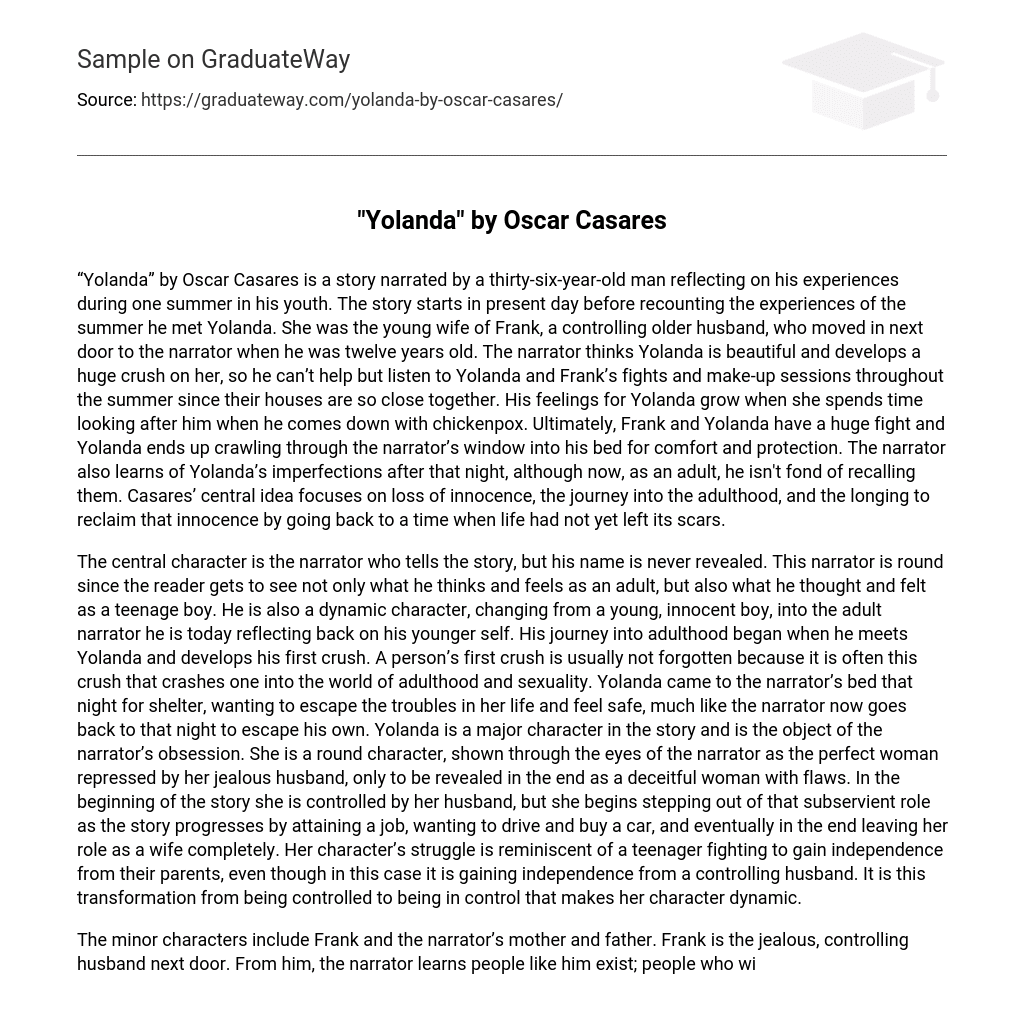“Yolanda” by Oscar Casares is a story narrated by a thirty-six-year-old man reflecting on his experiences during one summer in his youth. The story starts in present day before recounting the experiences of the summer he met Yolanda. She was the young wife of Frank, a controlling older husband, who moved in next door to the narrator when he was twelve years old. The narrator thinks Yolanda is beautiful and develops a huge crush on her, so he can’t help but listen to Yolanda and Frank’s fights and make-up sessions throughout the summer since their houses are so close together. His feelings for Yolanda grow when she spends time looking after him when he comes down with chickenpox. Ultimately, Frank and Yolanda have a huge fight and Yolanda ends up crawling through the narrator’s window into his bed for comfort and protection. The narrator also learns of Yolanda’s imperfections after that night, although now, as an adult, he isn’t fond of recalling them. Casares’ central idea focuses on loss of innocence, the journey into the adulthood, and the longing to reclaim that innocence by going back to a time when life had not yet left its scars.
The central character is the narrator who tells the story, but his name is never revealed. This narrator is round since the reader gets to see not only what he thinks and feels as an adult, but also what he thought and felt as a teenage boy. He is also a dynamic character, changing from a young, innocent boy, into the adult narrator he is today reflecting back on his younger self. His journey into adulthood began when he meets Yolanda and develops his first crush. A person’s first crush is usually not forgotten because it is often this crush that crashes one into the world of adulthood and sexuality. Yolanda came to the narrator’s bed that night for shelter, wanting to escape the troubles in her life and feel safe, much like the narrator now goes back to that night to escape his own. Yolanda is a major character in the story and is the object of the narrator’s obsession. She is a round character, shown through the eyes of the narrator as the perfect woman repressed by her jealous husband, only to be revealed in the end as a deceitful woman with flaws. In the beginning of the story she is controlled by her husband, but she begins stepping out of that subservient role as the story progresses by attaining a job, wanting to drive and buy a car, and eventually in the end leaving her role as a wife completely. Her character’s struggle is reminiscent of a teenager fighting to gain independence from their parents, even though in this case it is gaining independence from a controlling husband. It is this transformation from being controlled to being in control that makes her character dynamic.
The minor characters include Frank and the narrator’s mother and father. Frank is the jealous, controlling husband next door. From him, the narrator learns people like him exist; people who will yell at and do everything they can to control the world, even those they supposedly love. Knowing him takes away a piece of the narrator’s innocence because before knowing him, he did not realize this kind of person existed. Then there is the narrator’s mother and father, whose roles seem to simply help propel the story forward by giving more information about Yolanda and Frank. The central conflict of the story is an internal one between the narrator’s desire to gain back his innocence and having to live with the fact that it is gone forever. He thinks about Yolanda when “he can’t sleep at night,” implying there are numerous troubles in his life that keep him awake. He seems to want to go back in time, even if only in his mind, to before he realized the hardships of life, back to when a perfect world still seemed attainable, his innocence was still intact, and “things were different.” He tells the story of his loss of innocence and entry into the world of adulthood, but the conflict is ultimately left unresolved. The reader is left to assume that his internal conflict will continue and he will continue to think about Yolanda when he can’t sleep at night, since the memory of that night is the last time he felt “safe [enough] to fall asleep.”





